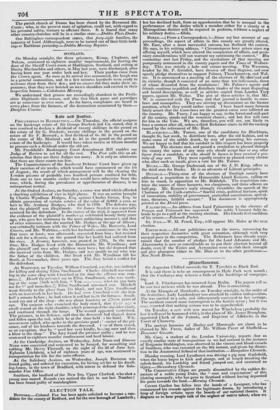ftliIrrTfintrou1.
Sir Augustus Clifford succeeds Sir T. Tymbitt as Black Rod.
It is said there is to be an encampment in Hyde Park next month ; that the Cockneys may witness a little of the hardships of campaign- ing.
Lord A. Fitzclarence has returned from Berlin. The papers tell us he saw two reviews while be was abroad. This is something.
At the Marquis of Hertford's, on Tuesday sennight, in the midst of
the festivities, Lady Londonderry was attacked by ud d en indisposition. She was carried to a sofa, and subsequently conveyed to her carriage. The accident caused some interruption to the festive scene; but it was sotii: reported that nothing serious was to be apprehended. On Tuesday, a iier: writ was moved for Winchelsea (probably the last it will ever be honoured with), in the place of Mr. James Brougham, appointed Clerk of the Patents, and Registrar of Affidavits in the Court of Chancery.
The ancient baronies of Morley and Monteagle are about to be claimed by Mr. Paver, father of Mr. William Paver of Sheffield.— Doncaster Gazette.
Mr. Case, a student of the London University, reports that an
exactly similar state of transposition as we had noticed in the instance of Benjamin Stubbington, was observed in the viscera and blood-vessels of Smithers, who was executed on the 9th instant, and given for dissec.; tion to the Anatomical School of that institution.—Hampshire Chronicle.
Monday evening, Lord Lyndhurst was driving a gig near Guilsfield, when the horse began to kick and :plunge, and at length breaking the splash-board, his Lordship and friend jumped out, and sustained no injury.—Shrewsbury Chronicle. The Conservative Clique are greatly discomfited by the sudden de- parture of a noble young Duke, the ‘• rose and expectation" of this plotting monopoly, who has gone to Scotland without having deposited his quota towards the fund.—Morning Chronicle. Covent Garden has fallen into the hands of a foreigner, who has ) commenced his 'crusade against the legitimate drama, by introducing a I heap of foreign artistes upon the boards of our national theatre. It disgusts us to hear people talk of the neglect of native talent, when we i dil ay see instances of the boundless patronage bestowed on foreign
1 adventurers. The spectral Paganinii by du t of lank visage, coarse black hair, and a few meretricious tricks upon a fiddle-string, contrives
, to excite the wonder of Englishmen, who allow him to pick their ! pockets to the tune of some thousands. Taglioni too, finding the sim- plicity of Englishmen so good a speculation, has managed to saddle not only herself, but her father and mother, brothers and sisters, Ike., upon that idiot John Bull, to the present exclusion from a patent theatre of ' all native merit. Covent Garden too, which never could be made to pay when devoted to English plays, and managed by English people, has suddenly become the resort of fashion, now that it contains a troop of foreign performers under the direction of a foreign manager. Laporte has, in addition to all this, ventured to calculate so far upon the mean-spirited submission of an English audienc.2 to foreign imposi- tion, that he has dared to do that which partly caused the 0. P. row when done by John Kemble,—namely, he has appropriated to private boxes.a great portion of the theatre formerly allotted to the public.—
Issac Cohen, a German Jew, is now living at Coventry, of the ad- vanced age of one hundred and four years, with health and faculties seemingly unimpaired._ Globe. The Prince of Bohan will have to suffer his sentence of three months' imprisonment, a fine of 1,000 francs, and all Madame de Feucheres' expenses in the late action arising out of the will of the Prince of Conde.
The Nuremberg Correspondent of the 19th instant says, that the health of the Duke of Reichstadt continues to improve.
A trial lately came before the Court of the Premiere Instance, Paris, in which a Count Saur sued for a sum of money for the pains he bad taken in procuring a husband for a young lady of fortune, named Renaide Clary ; she was an orphan, under the protection of two guardians, with whom the Count had negotiated. The family demanded—I. A Peer of France, or the son of a Peer (hereditary privilege was not then abolished), age between twenty and thirty. 2. A fortune of at least 100,000 francs (4,000/0 a-year. They would have been satisfied with a Duke' a Marquis, or even a Count; but in proportion as the rank lowered, the fortune was to rise by way of compensation. The nego- tiator was to receive one per cent, of the dowry, if the fortune of the husband were equal to that of the intended. But if it were reduced to 60,000 or 80,000 francs (2,500/. or 3,200/.) per annum, then his com- pensation was only a testimony of acknowledgment, in indemnity of the expenses into which he might be led. He proposed seventeen different husbands to the young lady; - but none of them suited. The court looked coldly on the Count's labours, and he, like his clients, was nonsuited.
A party of Customhouse-officers, having gained information that a band of smugglers were lodged a house in the Rue 1VIenilmontant, a few days since, went to make a search, and found a subterranean pas- sage upwards of 100 yards long and more than half-a-yard wide, cut thirty feet through a solid rolid reek, and communicating with a field beyond the walls of the town, by which the smugglers introduced con- traband goods into the city.— Galignani's Messenger.



























 Previous page
Previous page